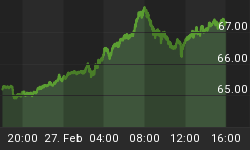Billionaire David Tepper, one of the most successful hedge fund managers in the world, attracted much attention in a September 24th CNBC appearance by presenting such unrestrained optimism that even the normally buoyant network hosts were somewhat surprised. In a rare interview, Tepper argued that all asset classes would go higher no matter if the US economy recovers or not (with the possible exception of the US dollar). His faith is derived from the belief that even if the US economy deteriorates and fails to raise markets through organic growth, the Fed will certainly step in with enough liquidity to push up stock and bond prices.
While Mr. Tepper may be correct in assuming that the major averages could rally in nominal terms if the Fed undertakes another round of quantitative easing, investors would still need to own the right assets to gain a real return on their portfolios. Like most professional investors, Mr. Tepper is only concerned with nominal, near-term performance.
Of course, in an environment of intractable inflation, most all asset classes will rise- but they will not do so at the same rate. Inflation is never evenly distributed throughout an economy and it affects various asset classes in different ways. The best assets to own in order to obtain a positive return after adjusting for inflation are commodities and commodity-producing stocks, especially those that do not keep their retained earnings in US dollars. The rarer the commodity, the more it will behave like real money and maintain its value during a currency debasement. Gold increases in price more than semi-precious metals because it has less capability of having its supply increased by discretion.
But the point missed by Mr. Tepper (and those at the central bank with whom he has placed his faith) is that the very inflation that will bolster stock prices will also destroy the underlying US economy. The Fed currently has the hubris to believe that it has the ability to print the US into prosperity and that it will always be able to keep long-term interest rates from rising. It can't. The Fed can manipulate the yield curve lower through quantitative easing, at least initially; but the more bonds Bernanke & Co. purchase, the more quickly the rate of inflation will increase.
Right now, the yield on the 12-month T-bill is .25% and the rate of consumer inflation as purported by the government is about 1%. That means even when using a tortured metric like the CPI (25% of which is owners' equivalent rent), real interest rates are still negative. A better metric would be to use the price of gold, which has increased 30% YoY. Or how about using the CRB Index, a broad measure of commodity prices? It's gone up 13% over the past year. If you adjust nominal interest rates by using these measures, or even the dollar itself, which has lost 11% since June, rates are already profoundly negative.
So, the question is: how much more negative will the Fed be able to send interest rates before the bond vigilantes wake up from their suspended animation? After all, can anyone expect fixed-income investors to continue to accept plummeting real interest rates for very much longer? Once domestic bond investors regain consciousness-and they will most likely do so in concert with foreign holders of US debt and currency-a debt and dollar crisis will emerge. Then, the only buyer of US Treasury debt will be the Federal Reserve. An economy can't persist for very long by buying its own debt with printed money. The result will be a crumbling currency and soaring interest rates, especially on the long end of the yield curve. When rates rise despite the Fed's efforts to keep them down, that's game over for the "recovery."
The final kick in the head is that the depression the Fed has been trying desperately to avoid will still occur- except that it will be accompanied by runaway inflation and rapidly increasing interest rates instead of falling prices and reduced debt expense. Those investors like David Tepper who choose to believe they can keep up with inflation simply by investing in "everything" will be shocked to discover how little their nominally high returns are actually able to buy.
For in-depth analysis of this and other investment topics, subscribe to Euro Pacific's Global Investor Newsletter. Click here for your free subscription.
Click here to download Euro Pacific's Special Report: My Five Favorite Gold & Silver Mining Stocks.
Be sure to pick up a copy of Peter Schiff's just-released economic fable, How an Economy Grows and Why It Crashes.















